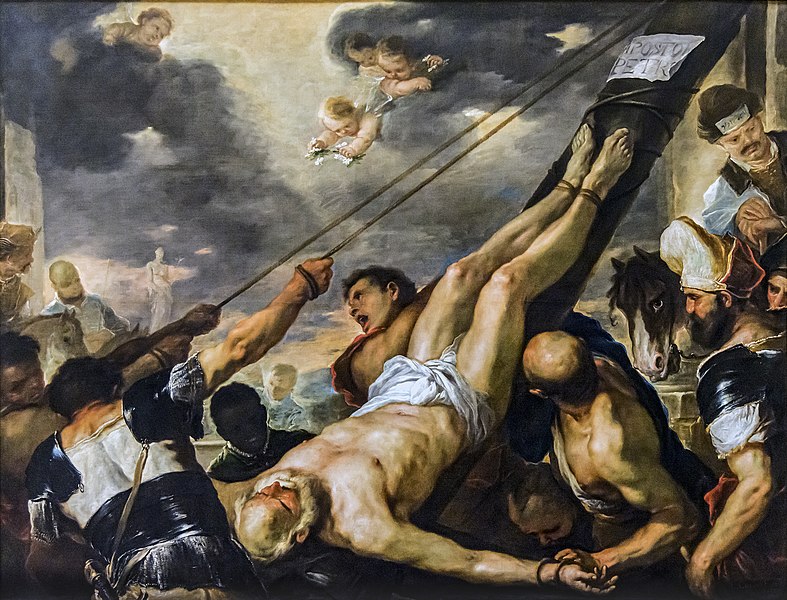by Jeffrey Burghauser (December 2023)

Now Nero in Rome had committed much black
____Depravity, killing Saint Peter the Pope
And staging a bitter, inhuman attack
On Romans deriving their ultimate hope
____In Jesus’s Mercy. He murdered Saint Paul,
Forced Seneca (once his confrère) to elope
With Death, set the city of Rome in a shawl
____Of spider-silk fire, extinguished his wife,
And murdered his mother by having the wall
Comprising her womb intersect with a knife,
____So that he might calmly examine the spot
In which he’d begun his nefarious life.
–
The people, detesting this merciless blot,
____Surrounded the palace. With harrowing spite,
The people agreed that the emperor ought
No longer to live. So, receding from sight,
____Lamentable Nero found refuge within
A plebian toilet, unable to fight.
A riot surrounded the privy. The din
____Increasing, unfortunate Nero embraced
His only companion, defender, or kin:
A truncheon of wood. In maniacal haste,
____He gnawed at the tip till it tapered into
An improvised point. Thus abandoned, disgraced,
Describing himself in a poetry due
____A better man (“O what a Maker of Art
Is fallen today!”), a presentiment grew.
Perceiving his commonplace falling apart,
____Beholding Dame Death, Nero’s substitute bride,
He pierced himself square in the stupefied heart,
And marveled at how well the point had defied
____His body’s surprisingly breakable fort.
The core of his body was cleft. And he died.
–
Internal dissension, the bloodiest sort,
____Produced a perplexingly gruesome parade
Of monsters who tried without shame to contort
The State to their will. Each new challenger paid
____The price that Ambition demands of her best,
Most resolute votaries: scaffolding weighed
With corpses. There’s Galba (a blade in his breast,
____His vacated head on a well-seasoned lance),
There’s Otho (a suicide at the behest
Of Honor, just after a thwarted advance
____Of troops in his horrible service), and then
Vitellius, keen for a food-induced trance,
Whose elephant-belly’s persistent Amen
____Afforded the despot such solace. A hole
Was only just made in the abdomen when
A lout’s-worth of viscera came to unroll.
____Not knowing the Savior whose sacrifice saves,
The moment his body relinquished his soul,
Vitellius, one of Impurity’s slaves,
____Was bellowing in his pathetic distress.
The shreds of his body were thrown to the waves
Whose numberless fingers were eager to bless
____Whatever fell into their range with a quick,
Serene transformation from Less into Less.
–
And after his death no one knew who to pick;
____So many men (largely the Empire’s most
Distinguished) were thoroughly burnt as a wick.
Compassion was blank as a hurricane coast.
____Integrity’s glorious orchards were bare,
And virtue herself was quite nearly a ghost.
–
We now shall return to Jerusalem, where
____Vespasian destroyed on behalf of the Son,
Maintaining the anxious blockade with a rare
Degree of perfection, pursuing the one
____Objective on fancy’s remotest frontiers:
That heaven’s terrestrial duty be done.
–
At table one night while he sat with his peers,
____A stately contingent of messengers came
With news whose announcement elicited cheers
Of noblemen learning their emperor’s name.
–
_____________
From a translation of The Siege of Jerusalem, the anonymous fourteenth century Middle English epic. While it bears some connection with legitimate primary source material (including Josephus’s chronicle of the Revolt), The Siege of Jerusalem is a macabre fever-dream version of the story of Jerusalem’s destruction in AD 70. Of course, neither Vespasian nor Titus was a Christian; the circumstances surrounding the siege differed both in detail and character from what’s depicted here. The manner in which the characters are presented has more to do with the fourteenth century writer’s rhetorical priorities (he’s clearly a pro-Crusade propagandist) than with historical accuracy. Therefore, these characters should be regarded, for all intents and purposes, as fictional.
Table of Contents
Jeffrey Burghauser is a teacher in Columbus, Ohio. He was educated at SUNY-Buffalo and the University of Leeds. He currently studies the five-string banjo with a focus on pre-WWII picking styles. A former artist-in-residence at the Arad Arts Project (Israel), his poems have appeared (or are forthcoming) in Appalachian Journal, Fearsome Critters, Iceview, Lehrhaus, and New English Review. Jeffrey’s book-length collections are available on Amazon, and his website is www.jeffreyburghauser.com.
Follow NER on Twitter @NERIconoclast







